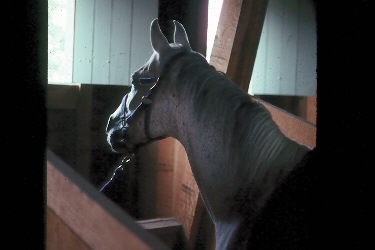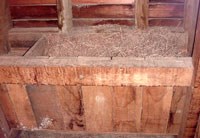
The dragoon's routine began at daybreak, when reveille sounded. Fifteen minutes later the stable call was blown, which was repeated 40 minutes before noon and immediately after retreat. The principles for feeding and watering the animals were well established. At reveille about an hour to an hour and a half before drill, the horses were fed a small amount of grain. All the animals were fed the same amount because of the difficulty in measuring individual amounts in the semidarkness and the general hurry before breakfast. After they had eaten, the horses were led out, and during stables, the feed boxes and hayracks were thoroughly cleaned and fresh hay placed in the latter. After morning stables, the horses were watered and tied to their stalls to give them a chance to munch in the hay. The horses were fed in small quantities and often, because the stomach of the animal was small. Usually hay was fed before the corn or grain to cause the animal to eat more slowly. When hay was not available, chaff or shop was mixed with the grain. Horses were never worked hard immediately after a full feed, although during a march, continuing on was not considered harmful. The horses were watered before they were fed to prevent loss of nourishment or colic. The only exception to this rule being in the morning. Horses could be watered other times also but usually did not require as much. At noon the animals were watered and about four pounds of oats were given to them. Unless it was extremely hot or inclement, the horses were then tied outside. In the evening they were watered, given the remainder of the hay and then about five pounds of oats or corn. If a horse bolted his feed, a few large stones could be place in the manger to prevent his taking large mouthfuls. The forage ration for horses was fixed at 14 pounds hay or fodder and 12 pounds of oats, corn or barley, but this could not always be met at distant and remote outposts. In the spring of 1844, dragoon horses received a daily allowance of four quarts of corn, six quarts of oats, and 14 pounds of hay. The corn and oats were two quarts shy of the ration. 
Almost immediately after the dragoons arrived to construct Fort Scott, bids were asked for 1200 bushels of oats for the dragoon horses "now at Douglas’s farm 10 miles from this place." Hay usually was bid in quantities of 250 tons. Prices for the hay varied. In 1847, prairie fires destroyed most of the prairie hay and drove the price up. It may have occurred again in 1850, when the bid accepted was $6.90 a ton. Earlier prices had been as low as $2.25 a ton. Bids for prairie hay called for the hay to be, "merchantable, well cured, well stacked (no ricks) on good bottoms and well salted, with salt furnished by the United States." A ton consisted of 2000 pounds, and the Quartermaster reserved the right to increase or diminish the quantity by one-third after entering into the contract. In 1844, a straw cutter and a hay scale were requisitioned by the Quartermaster, the latter probably to ensure accuracy of weight. A bushel contained 2150 cubic inches and an Army wagon, when full, held about 49 bushels. A bushel of corn on the cob was rations for one day for five horses. Shelled corn fed four. Ear corn was the feed used whenever available at garrisons. It was preferred to shelled corn, because it quickly could be determined whether it was good or not. Only an expert could tell whether some of the shelled corn was musty. Horses also ate their ear corn more slowly, taking time to bite it and digest it. Troopers felt there was no equal to the ear corn and prairie hay for feeding their horses. In 1842, Daniel Waldo delivered 12,000 bushels of corn at 29 3/4 cents a bushel to the Quartermaster to feed the horses at Fort Scott. Storing the corn and oats was a problem; for as late as 1847 there were no cribs at the post. A horse's water was as important as the feed. Each animal consumed about eight gallons a day. At Fort Scott, the horses probably were watered at the river: no evidence of watering troughs has been uncovered. An easy method of making a trough during this period was to hollow a tree trunk, all evidence of which probably would have disappeared after the abandonment of the fort. In the twentieth century, watering troughs were built from boards and were high enough to prevent pawing over the rim. Each trough held about eight-to-ten-inch depths of water and was broad enough to allow at least a yard of width for each animal while drinking. The horses were led to the trough and allowed to have their fill, before others were brought up. Watering troughs had to be cleaned, and sick animals were watered separately from buckets. The information for this section was taken from the Historic Furnishing Report forThe Dragoon Stables by Sally Johnson Ketchum. |
Last updated: July 25, 2016

